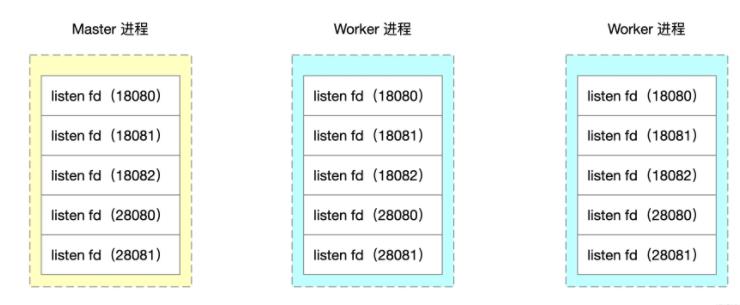Nginx is a free, open source, high-performance, lightweight HTTP server software, widely used in the Internet. However, because Nginx often faces the public network and is responsible for important Web services, it needs to perform regular security performance monitoring and anomaly detection, and take timely and effective security measures to ensure the normal operation of the website and the security of data.
1. Nginx security performance monitoring
Nginx security performance monitoring mainly includes the following aspects:
(1)Nginx access log monitoring
Nginx's access log records all HTTP request and response information, including source IP, URL, request method, response status code, etc. By monitoring access logs, abnormal requests such as batch attacks, crawler behaviors, etc. can be discovered in time.
(2) Nginx error log monitoring
Nginx error log mainly records the errors and exceptions encountered by the server when processing requests, such as connection timeout, request header is too large, etc. . By monitoring error logs, fault phenomena can be discovered in time and effective troubleshooting can be carried out.
(3) Nginx connection number monitoring
Nginx connection number monitoring can help us promptly detect excessive server load and take timely adjustments and optimization measures to ensure that the website is efficient and stable run on ground.
(4) Nginx’s CPU and memory utilization monitoring
Nginx’s CPU and memory utilization monitoring can help us promptly discover insufficient or excessive usage of server resources and take optimization measures in a timely manner.
2. Nginx anomaly detection
Nginx anomaly detection mainly detects the following common anomalies:
(1) Malicious attacks
Malicious attacks include DDoS attacks, SQL injection attacks, XSS cross-site scripting attacks, etc. By monitoring requests and responses, abnormal requests and responses can be discovered in time, and corresponding defensive measures can be taken, such as blocking IP addresses, filtering malicious requests, etc.
(2) Faults
Faults include connection timeout, response exception, request exception, etc. By monitoring the error log, fault conditions can be discovered in time, and troubleshooting and solution measures can be taken in a timely manner.
(3) Performance issues
Performance issues include excessive response time, excessive resource consumption, etc. By monitoring CPU and memory utilization, performance problems can be discovered in time and optimized and adjusted.
3. Summary
In terms of Nginx security performance monitoring and anomaly detection, we need to pay attention to elements such as access logs, error logs, number of connections, CPU and memory utilization. At the same time, regular monitoring and testing are needed to detect abnormal situations in a timely manner and take corresponding measures to ensure the stability of the website operation and the security of the data.
The above is the detailed content of Nginx security performance monitoring and anomaly detection. For more information, please follow other related articles on the PHP Chinese website!
 内存飙升!记一次nginx拦截爬虫Mar 30, 2023 pm 04:35 PM
内存飙升!记一次nginx拦截爬虫Mar 30, 2023 pm 04:35 PM本篇文章给大家带来了关于nginx的相关知识,其中主要介绍了nginx拦截爬虫相关的,感兴趣的朋友下面一起来看一下吧,希望对大家有帮助。
 nginx+rsync+inotify怎么配置实现负载均衡May 11, 2023 pm 03:37 PM
nginx+rsync+inotify怎么配置实现负载均衡May 11, 2023 pm 03:37 PM实验环境前端nginx:ip192.168.6.242,对后端的wordpress网站做反向代理实现复杂均衡后端nginx:ip192.168.6.36,192.168.6.205都部署wordpress,并使用相同的数据库1、在后端的两个wordpress上配置rsync+inotify,两服务器都开启rsync服务,并且通过inotify分别向对方同步数据下面配置192.168.6.205这台服务器vim/etc/rsyncd.confuid=nginxgid=nginxport=873ho
 nginx php403错误怎么解决Nov 23, 2022 am 09:59 AM
nginx php403错误怎么解决Nov 23, 2022 am 09:59 AMnginx php403错误的解决办法:1、修改文件权限或开启selinux;2、修改php-fpm.conf,加入需要的文件扩展名;3、修改php.ini内容为“cgi.fix_pathinfo = 0”;4、重启php-fpm即可。
 如何解决跨域?常见解决方案浅析Apr 25, 2023 pm 07:57 PM
如何解决跨域?常见解决方案浅析Apr 25, 2023 pm 07:57 PM跨域是开发中经常会遇到的一个场景,也是面试中经常会讨论的一个问题。掌握常见的跨域解决方案及其背后的原理,不仅可以提高我们的开发效率,还能在面试中表现的更加
 nginx部署react刷新404怎么办Jan 03, 2023 pm 01:41 PM
nginx部署react刷新404怎么办Jan 03, 2023 pm 01:41 PMnginx部署react刷新404的解决办法:1、修改Nginx配置为“server {listen 80;server_name https://www.xxx.com;location / {root xxx;index index.html index.htm;...}”;2、刷新路由,按当前路径去nginx加载页面即可。
 nginx怎么禁止访问phpNov 22, 2022 am 09:52 AM
nginx怎么禁止访问phpNov 22, 2022 am 09:52 AMnginx禁止访问php的方法:1、配置nginx,禁止解析指定目录下的指定程序;2、将“location ~^/images/.*\.(php|php5|sh|pl|py)${deny all...}”语句放置在server标签内即可。
 如何用PHP实现异常检测与欺诈分析Jul 30, 2023 am 09:42 AM
如何用PHP实现异常检测与欺诈分析Jul 30, 2023 am 09:42 AM如何用PHP实现异常检测与欺诈分析摘要:随着电子商务的发展,欺诈成为一个不可忽视的问题。本文介绍了如何用PHP实现异常检测与欺诈分析。通过收集用户交易数据和行为数据,结合机器学习算法,在系统中实时监测和分析用户行为,识别潜在的欺诈行为,并采取相应措施应对。关键词:PHP、异常检测、欺诈分析、机器学习一、引言随着电子商务的快速发展,人们在互联网上进行交易的数量
 深析如何通过Nginx源码来实现worker进程隔离Nov 06, 2022 pm 04:41 PM
深析如何通过Nginx源码来实现worker进程隔离Nov 06, 2022 pm 04:41 PM本文给大家介绍如何通过修改Nginx源码实现基于端口号的 Nginx worker进程隔离方案。看看到底怎么修改Nginx源码,还有Nginx事件循环、Nginx 进程模型、fork资源共享相关的知识。


Hot AI Tools

Undresser.AI Undress
AI-powered app for creating realistic nude photos

AI Clothes Remover
Online AI tool for removing clothes from photos.

Undress AI Tool
Undress images for free

Clothoff.io
AI clothes remover

AI Hentai Generator
Generate AI Hentai for free.

Hot Article

Hot Tools

EditPlus Chinese cracked version
Small size, syntax highlighting, does not support code prompt function

Safe Exam Browser
Safe Exam Browser is a secure browser environment for taking online exams securely. This software turns any computer into a secure workstation. It controls access to any utility and prevents students from using unauthorized resources.

Dreamweaver CS6
Visual web development tools

SublimeText3 Linux new version
SublimeText3 Linux latest version

mPDF
mPDF is a PHP library that can generate PDF files from UTF-8 encoded HTML. The original author, Ian Back, wrote mPDF to output PDF files "on the fly" from his website and handle different languages. It is slower than original scripts like HTML2FPDF and produces larger files when using Unicode fonts, but supports CSS styles etc. and has a lot of enhancements. Supports almost all languages, including RTL (Arabic and Hebrew) and CJK (Chinese, Japanese and Korean). Supports nested block-level elements (such as P, DIV),






